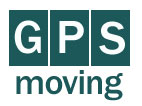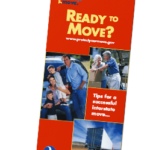Moving Tips, Guide, and Timelines
We have created a step by step guide and timelines wi help you with your move. Please select from the timeline dates below:
6 Weeks Before You Move•Contact the IRS. and/or your accountant for information on what moving expenses may be tax-deductible.
•Begin to inventory and evaluate your possessions. What can be sold or donated to a charitable organization? What haven't you used within the last year?
•Make a list of everyone you need to notify about your move: friends, professionals, creditors, subscriptions, etc.
•Obtain a mail subscription to the local paper in your new hometown to familiarize yourself with local government, social news and activities in your new community
•Locate all motor vehicle registration and licensing documents.
•If some of your goods are to be stored, make the necessary arrangements now. (Your moving counselor should be able to help.)
•Contact schools, doctors, dentists, lawyers and accountants and obtain copies of your personal records. Ask for referrals where possible.[/well]
4 Weeks Before You Move
•Arrange special transportation for your pets and plants.
•Contact utility and related companies (gas, electric, oil, water, telephone, cable TV, and trash collection) for service disconnect/connect at your old and new addresses. However, remember to keep phone and utilities connected at your current home throughout moving day.
•Contact insurance companies (auto, homeowner's or renter's, medical, and life) to arrange for coverage in your new home.
•If you're packing yourself, purchase packing boxes from your local mover. Pack items that you won't be needing in the next month.
•Plan a garage sale to sell unneeded items or arrange to donate them to charity.
3 Weeks Before You Move
•Collect important papers (insurance, will, deeds, stock, etc.).
•Arrange to close accounts at your local bank and open accounts in your new hometown
2 Weeks Before You Move
•If you're moving out of or into a building with elevators, contact the building management to schedule use of the elevators.
•Contact your moving counselor to review and confirm all arrangements for your move.
1 Week Before You Move
•Don't forget to withdraw the contents of your safety deposit box, pick up any dry cleaning, return library books and rented videotapes, etc.
•Take pets to the veterinarian if immunizations are needed. Get copies of pets' veterinary records.
•Drain gas and oil from power equipment (lawn mowers, snow blowers, etc.).
•Give away plants not being moved. •Prepare specific directions to your new home for your moving company. (Include your itinerary, emergency numbers, etc.)
Days Before You Move
•Have your major appliances disconnected and prepared for the move. (Again, your moving counselor can help with arrangements for a third party to provide these services.)
•Pack a box of necessary personal items for immediate use at your new home. Have this box loaded last or carry it with you.
•Organize and set aside those things that you're taking with you so they're not get loaded on the van in error.
•Contact your moving counselor to confirm arrival time of the moving van, as well as to notify him/her of any last minute details.
Moving Day
•Read your bill of lading and inventory carefully before you sign them. Keep these-and all related papers-in a safe location until move is successfully completed.
Household Moving Tips from GPS - Your Residential Movers
•Get organized now. Don't wait until the last minute. Make lists of things you need to do and when.
•Make sure you are ready for the packers and movers. Don't forget to do all of the laundry, wash all of the dishes, pack your suitcases, disconnect computers, stereos and VCRs. Place all the cords and remote controls in a safe place.
•Moving is an emotional time, especially for children. Make them part of the process. See Moving With Children. Make arrangements for pets during the move.
•Set aside those items that you will be taking with you on your trip and clearly mark them as DO NOT PACK.
•Make a list of everyone you need to notify about your move -- friends, professionals, creditors, subscriptions, etc. Arrange to close your accounts in your local bank and open accounts in your new hometown.
•Contact insurance companies (auto, home owners or renters, medical and life) to arrange for coverage in your new hometown.Contact insurance companies (auto, home owners or renters, medical and life) to arrange for coverage in your new hometown.
•Obtain a mail subscription to the local paper in your new community to familiarize yourself with your new hometown. Contact schools, doctors, dentists, veterinarians, lawyers and accountants and obtain copies of your personal records.
•Obtain a change-of-address kit from the post office. Designate one drawer of a dresser for sheets and towels so that you won't have to rummage through boxes for these essentials the first night in your new home.
•Once your refrigerator has been disconnected, thoroughly wash and dry the inside, then put a handful of fresh coffee, baking soda or charcoal in a sock or nylon stocking and place it inside to keep it smelling fresh and to avoid mildew.
Getting ready to move. Please review the following:




